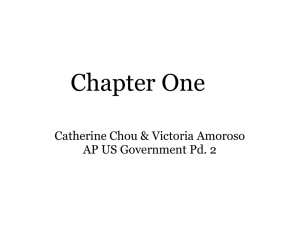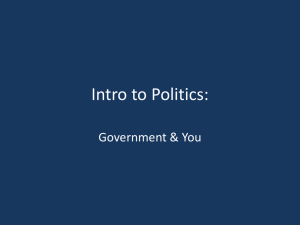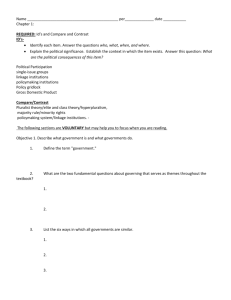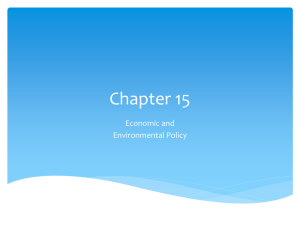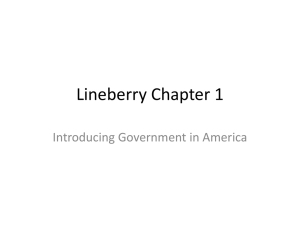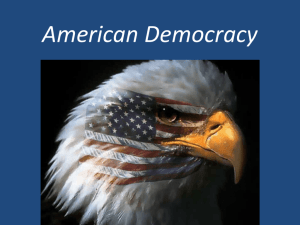Theories in Democracy
advertisement
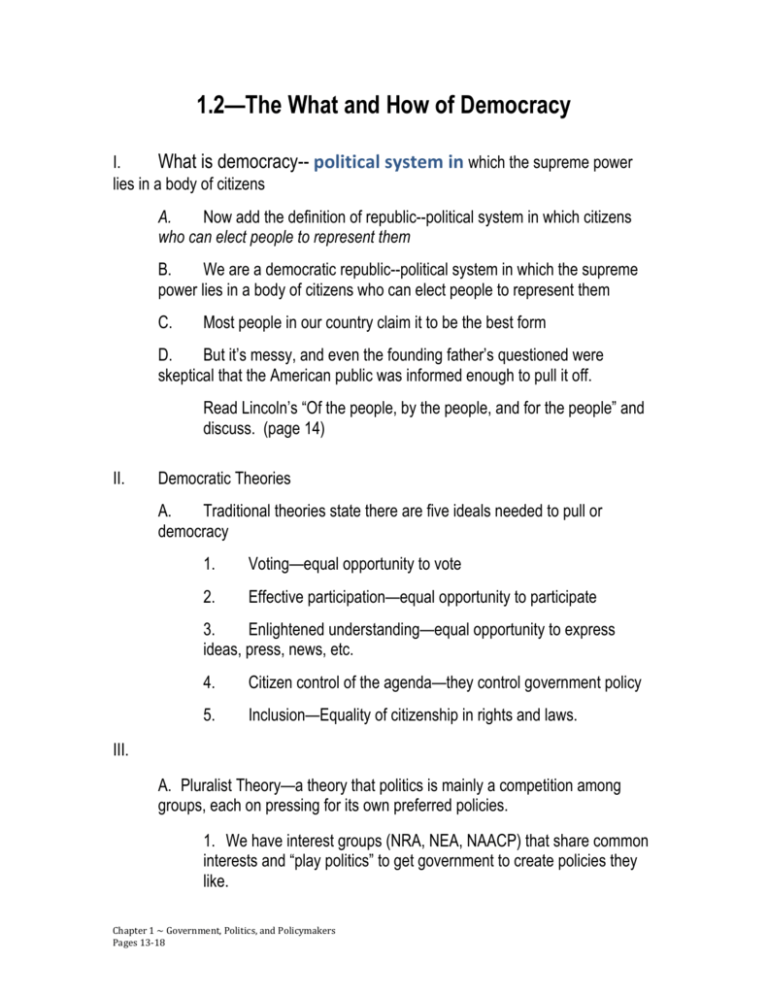
1.2—The What and How of Democracy I. What is democracy-- political system in which the supreme power lies in a body of citizens A. Now add the definition of republic--political system in which citizens who can elect people to represent them B. We are a democratic republic--political system in which the supreme power lies in a body of citizens who can elect people to represent them C. Most people in our country claim it to be the best form D. But it’s messy, and even the founding father’s questioned were skeptical that the American public was informed enough to pull it off. Read Lincoln’s “Of the people, by the people, and for the people” and discuss. (page 14) II. Democratic Theories A. Traditional theories state there are five ideals needed to pull or democracy 1. Voting—equal opportunity to vote 2. Effective participation—equal opportunity to participate 3. Enlightened understanding—equal opportunity to express ideas, press, news, etc. 4. Citizen control of the agenda—they control government policy 5. Inclusion—Equality of citizenship in rights and laws. III. A. Pluralist Theory—a theory that politics is mainly a competition among groups, each on pressing for its own preferred policies. 1. We have interest groups (NRA, NEA, NAACP) that share common interests and “play politics” to get government to create policies they like. Chapter 1 ~ Government, Politics, and Policymakers Pages 13-­‐18 2. Groups compete, and all groups will win sometimes, and no group wins always. 3. No one group becomes dominant because other groups will step up to balance the power. 4. An organized group can get a hearing from the government, providing a key “link” between people and government 5. Groups usually play by the “game rules” . . . few lie, steal, or cheat to get their way 6. Groups weak in one resource can use another . . . big business may have the bucks, but labor has numbers. B. Elite & class Theory—A theory contending that societies are naturally divided along class lines with the upper elite class ruling, regardless of how the government is organized. 1. Really folks, only the few big interest groups with money have power. 2. Numerous groups prove nothing because it’s impossible for them to be equal. 3. It’s impossible to have all politicians be void of corruption, so these groups eventually get their way with government. 4. The largest corporations hold awesome power. 5. Other groups may win many minor policy battles, but the corporate elites prevail when it comes to the big decisions. 6. As time goes by, more and more Americans agree with this theory. C. Hyperpluralist Theory—A theory contending that groups are so strong that government is weakened. 1. They think the pluralist system is out of control. 2. All groups have gotten strong enough to have power over politicians, who end up trying to please everybody all the time, which Chapter 1 ~ Government, Politics, and Policymakers Pages 13-­‐18 just creates weak policies that often contridict each other. 3. Groups have become sovereign, with government merely serving them. 4. If Congress doesn’t do what they want they sue, taking it to the courts. (Read the third paragraph under Hyperpluralism on page 17.) Chapter 1 ~ Government, Politics, and Policymakers Pages 13-­‐18 IV. Challenges to democracy A. Increased technical expertise 1. Traditional democratic theory believes that ordinary citizens and our elected officials have enough sense to make good decisions. 2. The reality is he world has become so complicated one MUST follow the advice of “experts.” B. Limited Participation in Government 1. Even with more political channels on TV, fewer Americans are tuning in. 2. ESPN and the cartoon channel compete . . . 3. The reality is Americans are becoming more unaware of how their own government works, or differentiating between government and politics. C. Escalating Campaign Costs 1. Bounderwoman could NEVER afford to run, she doesn’t have a corporation in her back pocket. 2. See Bounder Blog article of Supreme Court decision on corporate donations to campaigns. D. Policy Gridlock 1. Goes with the Hyper-pluralist theory 2. Groups don’t have the power to get their policy through 3. But they do have the power to squawk about a policy they hate, and put the kabash in it. Chapter 1 ~ Government, Politics, and Policymakers Pages 13-­‐18
